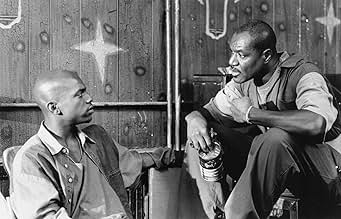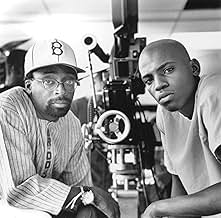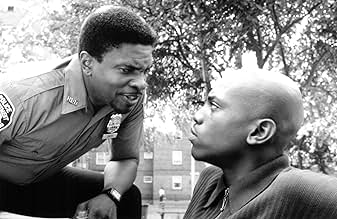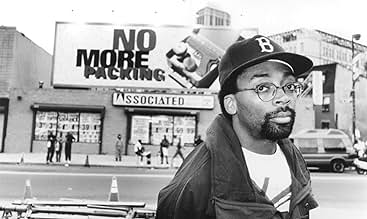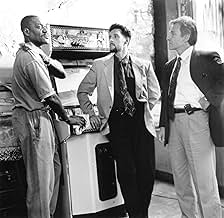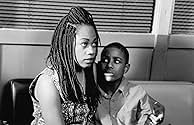Los jóvenes traficantes de drogas de las viviendas sociales de Brooklyn llevan una vida complicada y peligrosa, atrapados entre sus superiores y los detectives que intentan detenerlos.Los jóvenes traficantes de drogas de las viviendas sociales de Brooklyn llevan una vida complicada y peligrosa, atrapados entre sus superiores y los detectives que intentan detenerlos.Los jóvenes traficantes de drogas de las viviendas sociales de Brooklyn llevan una vida complicada y peligrosa, atrapados entre sus superiores y los detectives que intentan detenerlos.
- Premios
- 6 nominaciones en total
- Tyrone
- (as Pee Wee Love)
- Errol Barnes
- (as Tom Byrd)
- Go
- (as Fredro)
- Horace
- (as E.O. Nolasco)
- Sharon
- (as Lisa Arrindell Anderson)
Opiniones destacadas
The main plot is a form of crime thriller, with Keitel playing the cop trying to uncover the truth behind the murder. However the plot is not what this film is about - this is basically a film about the effects on drugs on the NY ghettos. Strike is the "average black man", while his protégé, Tyrone (Peewee Love) is "black youth". The film tries to show the forces placed on them by their situation, their role models and the few options they have in life. Rodney represents the draw of selling drugs, of quick money while policemen Andre (Keith David) and Klein represent his conscience trying to get him to do the right thing - Andre and Tyrone's mother (Regina Taylor) particularly doing right by your own community.
The message is at times forced, Keitel's sequence towards the end is very clever cinematically but feels a bit like a sermon, but at other times we're allowed to work it out ourselves. Strike is not judged but allowed to be pulled by the situation around him, his sickness representing the sickness of his situation. Through him we see the pressures that are on him to act like his peers and the bad role-models he has in his life. In Shorty we see the same things affect the next generation and, while his aping of Strike is clumsy, you again see how the lack of good role-models reduces the options for an otherwise intelligent kid. The best thing about the comparison of Lindo and Keitel is that neither is judged - both are allowed to show themselves as appealing, Lindo appears as a parent, almost seeking the best for all his workers and Keitel is allowed to be an honest cop with a good moral code. However both are also seen in a bad light, Lindo brings out the violence, pressure and treachery of his character - a man who is really out for himself while the way Keitel pressures Strike is seen as bad as Rodney's pressure and reveals a racist angry streak within himself. We are left wondering how anyone can survive between the two.
Phifer is good as Strike and manages to avoid just doing a ghetto-movie type of performance, he makes you believe that he is trapped in a no-win situation. Isaiah Washington gives another in a string of strong performances as the honest man trying to get by. Lindo is great as drug dealer Rodney, mixing paternal aspirations with moments of sudden viciousness. Keitel and John Turturro act below their station and aren't given much to work with, Keitel especially doesn't always manage to carry the moral core of the story without preaching. Two small roles of interest are Tom Byrd as Errol who has plays the fallen dealer with AIDS, however not enough is explained about his character, also Michael Imperioli (better known as Chris in The Sopranos) plays bent cop Jo-Jo. Peewee Love stands out as Shorty/Shorty, sucked into a world that lacks choice.
The film looks great, the whole thing has a bright colourful sheen on it that is very attractive to look at. Combined with Lee's stylish director it makes for a beautiful film - although some scenes are shot differently and on different stock, to make a point, although I'm not sure what that point is. The music is as good as most of Lee's movies, a mix of soul and hip hop, it is better than many ghetto films that just assume that the hip hop is all that's needed to help the mood.
This is a good example of the lack of options that exist in the ghetto and, besides some very obvious preaching, it makes it's point without shouting it at the audience. The only failing is that Lee bottles it near the end, delivering a sentimental ending of hope that is unfortunately not the truth in many cases.
It is not an easy film. It is bleak and at times very off-putting. Actually, if you are a thinking, caring person, this is movie is overall heart-breaking.
But it is brilliant and, for the person who truly tries to understand it, a compelling, insightful look at the problems killing black America today. The only reason for the film's lack of recognition I can imagine is that its subject matter had been examined a number of times before. But the inescapable fact is that this one of the best examinations of the subject matter there has been on screen - on par with "Boyz N The Hood".
And it is FAR from uncreative. In fact, on one level, it is not a "hood" movie, but a whodunit. The mystery aspect of the plot is very interesting. But there are other, more important layers. It is the story of the confusion and crisis of a young man's life. Most importantly, it is a brutal look at drugs, guns, and life in the projects. It is a movie asking why so many young black men are dying in the streets.
The lead character Strike has a stomach problem. It might be an ulcer or something like that. I believe it is a metaphor. Just as heat represented racial tension in Lee's masterpiece "Do The Right Thing", Strike's sickness represents the illnesses plaguing the ghetto: drugs, guns, liquor.
Like DTRT, this film looks at community. The mothers, the cops, the young people, the kids, the men trying to make a living - there is eloquent commentary in "Clockers" on the situations of all. In Spike's movies, paying a little attention is rewarding. A good essay could be written on what I call the Spike Summarization technique. This is when Spike compresses a serious debate or concern in the black community into a few expressive moments of action or dialogue. There are better examples in other movies, but it manifests in "Clockers" a few times. A bunch of kids are sitting in front of Rodney's (Delroy Lindo) shop; one of the kids is rapping while the others pay attention. The two sides to the coin: we feel the artistry and skill of the moment, the continuation of a rich tradition of oral art; we're also struck by the cruelty and coldness in the kid's violent lyrics, and we think about where that comes from.
Stylistically, this movie is a huge success. The cinematography is amazing, and I wonder what must be wrong with my tastes when I'm floored by a film like this and find visually bland a more oft-praised classic. The projects become blinding panoramas, landscapes which add tons of meaning to the poignant ending (I won't reveal it here). The sound is great; many films of this nature use hip hop in the soundtrack to produce certain effects, but "Clockers" does it in a more methodical way which jars some people, but contributes to the film's meaning.
I could say more about the film, but I encourage you to just see it, along with the rest of Spike's oeuvre. He's not a perfect filmmaker, and some of his best films are marred by elements that don't work, but I feel his consistency in terms of delivering brilliance is not below most of the cinema's most celebrated auteurs.
The way I see it, this is being a pretty good portrayal of live on the streets in the '90's. It picks a mostly realistic approach but still I just can't really 'feel' this movie. I never felt involved with any of the characters in it or to any of the dramatic events and developments. It doesn't make this movie bad but it does indeed make this movie a bit of a one dimensional experience.
And remember, this is an 1995 movie. So everything that was considered to be hip and 'thug life' might seem a bit ridicules and less cool in today's perspective. The whole attitude and way of talking and the way everyone dresses makes this movie really a product of its time. In that regard this movie also really reminded me of "Kids", which coincidentally or not, got made in the same year as this movie. It makes this movie less relevant to watch now days but really, it's nothing I was holding against the movie.
I would had most definitely preferred it if this movie was using a more straightforward style of storytelling. The movie as it is seems to be wanting to focus on far too many different characters and tries to do and tell too much. It also really has its own style to it, when it comes down to its storytelling, which was nice and helped to give this movie an unique feeling but at the same time it also made the movie unnecessary hard and not all that pleasant to follow at times.
Another thing I also disliked about this movie was its pick of music. The movie mad some bad music choices, in which the music often would swell and become melodramatic at moments that really were uncalled for. It absolutely distracted and most of the time didn't suit what was happening on the screen at the time.
But really, I though this movie still had some hints of a great movie in it as well. One thing was its already earlier mentioned unique and distinctive style. Spike Lee always has had an unique and distinctive style of his own and he manages to put a lot of that in this movie successfully. There are some interesting moments in this movie, from a more technical and movie-making perspective. There was some good camera-work for instance and also very little wrong with the movie its editing and pacing.
The movie its story in essence also really seemed to be a solid one but I do feel that they perhaps should had picked some different perspectives to keep- and make things a bit more interesting and effective. Wouldn't this movie for instance had been better and more interesting if it told things more from the Harvey Keitel's character perspective? Who knows and it's not like the movie bad or interesting as it is right now but while watching this movie it constantly gave me the feeling it had more potential and things could had been done better.
I don't know, perhaps the movie was also being a bit stuck between being a gangster movie and a more realistic one. It never felt like a true gangster flick and it never felt like a true realistic movie neither. Producer Martin Scorsese perhaps should had stepped in a bit more often, since he definitely is a kind of director who can more successfully blend realism with tough and tense gangster/crime movies.
Not trying to sound too negative. The movie is good enough as it is but it doesn't ever reaches its full potential.
7/10
http://bobafett1138.blogspot.com/
¿Sabías que…?
- TriviaWas originally supposed to be directed by Martin Scorsese. Rocco Klein would have been the main character, played by Robert De Niro. Scorsese changed his mind, opting instead to direct Casino (1995), and De Niro went with him. Scorsese then asked Spike Lee if he wanted to direct. Lee accepted (and decided that Strike, not Rocco, would be the primary character), and Scorsese was given an "Executive Producer" credit.
- ErroresWhen Detective Mazilli is walking up to the back of the Mercedes Benz to talk to the kids inside his badge/shield is that of an NYPD Detective. However when he shows it to the driver of the car it is the shield of a NYPD Sergeant.
- Citas
Rodney: If God created anything better than crack cocaine, he kept that shit for hisself. I mean, that shit is like truth serum. It will truly expose who you are. I mean, you happen to be a low-life rat bastard motherfucker, who will sell off his newborn for a suck off that glass dick, crack will bring it right on in the light. Now, I don't care you black, white, Chinese, rich, poor. You take that first hit, you on a mission. And that mission will never end. Even when the house, the money, loved ones are gone, they send you to the joint, you still gonna try to cop.
Ronald 'Strike' Dunham: No doubt.
Rodney: Only time it ends, Strike, that mission, when you six feet under.
- ConexionesFeatured in Crooklyn Dodgers: Return of the Crooklyn Dodgers (1995)
Selecciones populares
- How long is Clockers?Con tecnología de Alexa
Detalles
Taquilla
- Presupuesto
- USD 25,000,000 (estimado)
- Total en EE. UU. y Canadá
- USD 13,071,518
- Fin de semana de estreno en EE. UU. y Canadá
- USD 4,463,560
- 17 sep 1995
- Total a nivel mundial
- USD 13,071,518
- Tiempo de ejecución
- 2h 8min(128 min)
- Color
- Mezcla de sonido
- Relación de aspecto
- 1.85 : 1


